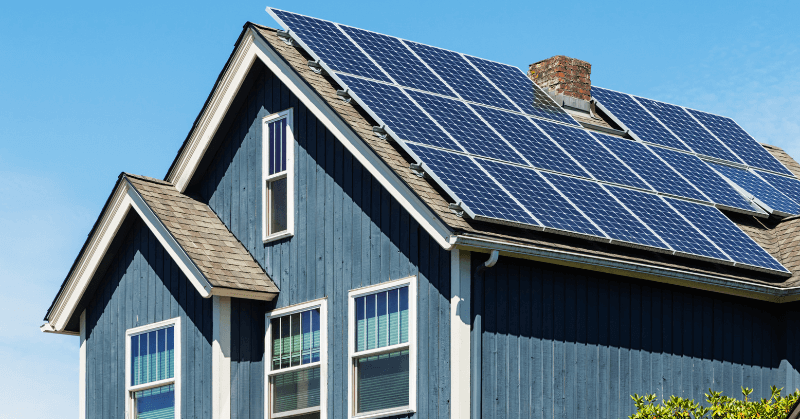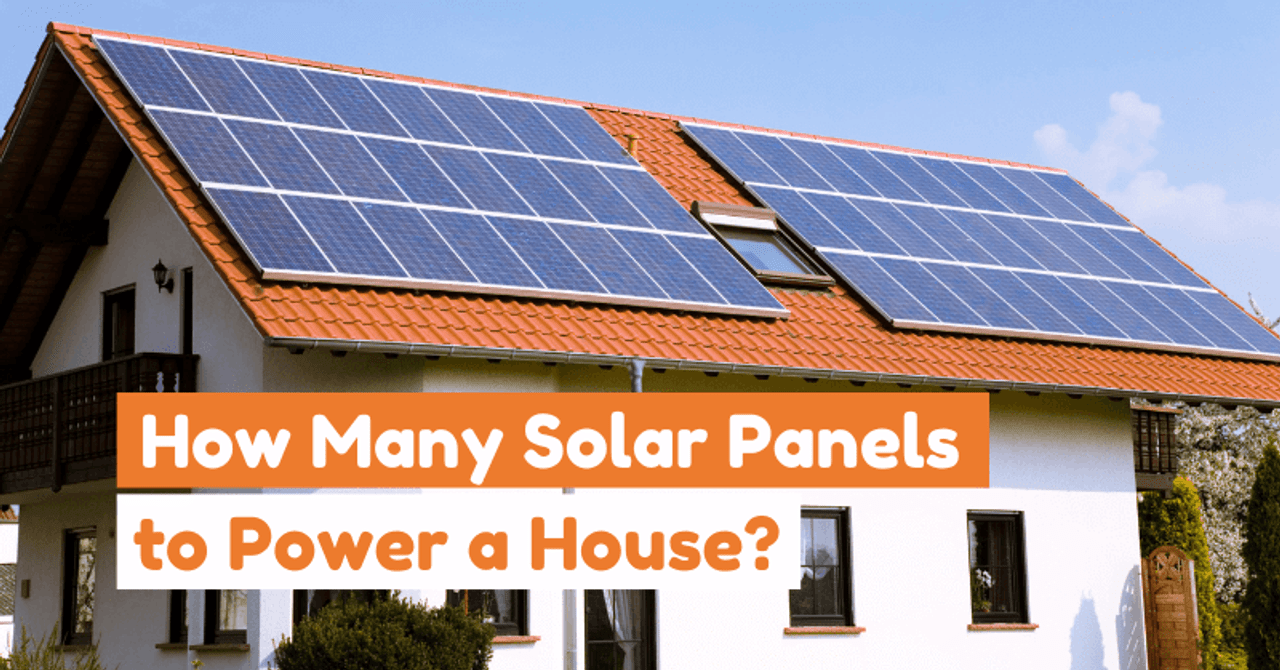How Many Solar Panels to Power a House? Comprehensive Read
Solar energy is easily accessible to everyone in the 21st century like never before. Millions of homeowners and commercial buildings have shifted to this technology to reduce their electricity bills. But the main question that arises every day is “How many solar panels to power a house?” Are you thinking of the same?
Well, the reason why people often ask about the number of solar panels they need to install is that it tells them their energy needs and the amount required for investment in a home solar power system. Once you know your energy requirements, you can easily calculate the cost of a solar system you want to install in your home.
In this article, you will learn how to determine the number of PV panels for your home, where to get trusted solar equipment, how this system works, and the cost of installing a home solar energy system.
How many solar panels do you need to power a house?
If you don’t know how many panels are required to power your house, you can’t go ahead and install a solar power system. Let’s explore how you can calculate the number of PV panels required to fulfill your energy needs.

Before proceeding with the detailed analysis, familiarizing yourself with the key factors (as listed below) affecting the number of solar panels is necessary.
1. Energy consumption (annual)
This is the most important factor you must keep in mind when calculating the desired number of solar panels. The amount of energy you consume annually is proportional to the number of PV modules you need. The higher the energy consumption, the more the more solar panels you will need. The electricity or energy consumption is calculated in kWh.
As per the statement of the US Energy Information Administration (EIA), the average annual energy consumption of homeowners is 10,791 kWh. It becomes a monthly energy usage of 899kWh. So, we can calculate the number of solar panels, considering you fall in the same category.
2. PV panel power (wattage)
The power of a solar panel is also known as its rating. Let’s first understand what the power of a PV module is. Electricity generated by a solar panel at its output terminal under ideal conditions is called a panel’s wattage or power. The internationally accepted unit to measure power is the watt (W).
Usually, the solar panels' wattage lies between 200 and 400W. It can be lower and higher, too. Suppose you want to buy panels of 400W for your home solar system. We will calculate the number of panels accordingly.
3. Production ratio
The estimated energy of a solar panel system output over time (in kWh) to the actual size of the system is known as the production ratio. It depends on the time your solar power system remains exposed to sunlight.
For instance, if you have installed a 9kW solar energy system in your home and it generates 12 MWh of electric power in one year, the production ratio of your system will be 1.3 (12/9). It is a realistic production ratio you can see in various systems across the globe. Production ratios are generally between 0.9 and 1.6 in the United States.
Calculating the number of panels you need
Now that you are familiar with the three factors associated with the number of PV modules you need for your home-based solar electric system. It is time to calculate the number of panels, considering your annual energy consumption, panel wattage, and production ratio.
Solar panel count = annual energy consumption/production ratio/panel wattage
For the production ratio of 0.9:
Solar panel count = 10791/0.9/400 = 29.975
= 30 panels
For the production ratio of 1.6:
Solar panel count = 10791/1.6/400 = 16.86
= 17 panels
This is how you can easily calculate the number of PV panels you need for a home solar system.
How to get solar panels for your home?
It is time to get familiar with where to buy panels for your home solar power system. Four recommended ways to buy PV panels are as follows.
- Buy DIY solar kits for self installation. You can find these kits in home improvement stores, such as Amazon or Home Depot.
- Buy PV panels directly from the manufacturer’s website.
- Purchase panels from authorized dealers of trusted manufacturers.
- Visit approved and licensed solar panel companies in your area and explore different brands.
Note: If you need long-lasting solar panels for your home, contact Renogy. A highly recommended panel at Renogy is a 200W 12V monocrystalline solar panel.
- 1000 Watt-hours of electricity per day (5-6 hours of direct sunlight)
- 10-year workmanship warranty, 25-year 80% output warranty.
- 9 bus-bars and PERC cell technology optimize overall efficiency.
- Half-cut cells and bypass diodes enhance accidental shading tolerance.
How does a solar panel work on your house?
Solar panels are installed at higher places in your home where they are exposed to sunlight for maximum time. Usually, you will see solar power systems installed on rooftops. Here is a detailed working of a solar panel on your house.
- A solar panel is made up of multiple mini solar cells. Each cell is soldered together to form a big PV panel. They capture sunlight at first.
- Solar cells convert the captured sunlight into electrical charges that interact with internal electrical fields. This is how the DC current is formed.
- The DC current is converted into AC current using solar inverters.
- AC electricity is supplied to your home to operate all the appliances (both light and heavy loads.)
- In the daytime, you can directly benefit from solar energy. If you want to use this energy at night, you will need batteries to store excess solar power generated during the day.
This is how home solar power systems work to power your house with solar energy.
How much does one solar panel cost for a house?
There is no single answer to this question, as the cost of one PV panel depends on various factors, as given below.
- Efficiency: The cost of less efficient panels will be lower than those with an improved efficiency.
- Type of panel: The cost of one solar module highly depends on what type of panel you want to buy. For example, the cost of monocrystalline, bifacial, portable, and rigid solar panels is different from each other.
- Size: Just like the efficiency and type of PV panel, the size matters a lot. Panels with higher output power are more costly than those with less output power. For example, the cost of a 400W solar panel will be higher than a 200W panel.

The cost of general-purpose PV modules lies between $99 and $1,000. If you want to buy a self-install PV panel kit, it will cost you less but you will get less energy in return, too. You don’t need to have advanced solar knowledge to use these kits. Plus, they are portable.
A solar system that meets all of your home energy requirements costs you thousands of dollars, as it gives you complete energy independence. Obviously, it consists of multiple solar panels.
If you are searching for reliable solar panels at competitive prices, Renogy is a reasonable place to make your purchase.
Final Words
How many solar panels to power a house? It all depends on your annual energy consumption, the production ratio, and the panel’s wattage. The complete process to calculate the exact number of solar panels you need for your home is presented in the discussion above.
For a house of 1,000 square feet to 2,000 square feet, 10 to 17 solar panels are enough to power up the electrical appliances of your home.
If you are familiar with how many solar panels you need for your home electric system and are looking to buy trusted solar panels, batteries, chargers, solar charge controllers, or inverters, getting in touch with Renogy will be worth it.
FAQs
Q: How many solar panels are needed for a 1500 sq ft home?
A: A solar system of 6.6kW is usually enough to meet the electricity requirements of a 1500-square-foot home. Suppose you buy 400W solar panels. In that case, you will need 16 solar panels for your house. If the power of your solar is different, the number of panels required will be changed accordingly. Usually, 15 to 20 solar panels work perfectly for a 1500-square-foot house.
Q: How many solar panels do I need for a 2000 sq ft home?
A: If you are living in a 2000-square-foot house, you will need a 7kW solar energy system. For this, you will need 21 solar panels. Usually, 16 to 21 solar panels are recommended for a 2000-square-foot house.
Q: How much solar power is required to run an average home?
A: The average home size in the US is 2,000 square feet. If you are living in a similar-sized home, the power requirement will be between 630kWh and 840kWh.
Q: Can 4 solar panels power a house?
A: If you are living in a one or two bedroom apartment, 4 to 8 solar panels will be able to power your house.











